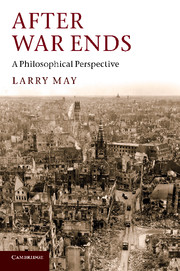Book contents
- Frontmatter
- Contents
- Acknowledgments
- Chapter 1 Introduction
- Part I Retribution
- Chapter 2 Grotius, sovereignty, and the indictment of Al Bashir
- Chapter 3 Transitional justice and the Just War tradition
- Chapter 4 War crimes trials during and after war
- Part II Reconciliation
- Part III Rebuilding
- Part IV Restitution and reparation
- Part V Proportionality and the end of war
- Bibliography
- Index
Chapter 4 - War crimes trials during and after war
Published online by Cambridge University Press: 05 June 2012
- Frontmatter
- Contents
- Acknowledgments
- Chapter 1 Introduction
- Part I Retribution
- Chapter 2 Grotius, sovereignty, and the indictment of Al Bashir
- Chapter 3 Transitional justice and the Just War tradition
- Chapter 4 War crimes trials during and after war
- Part II Reconciliation
- Part III Rebuilding
- Part IV Restitution and reparation
- Part V Proportionality and the end of war
- Bibliography
- Index
Summary
War and law sit in a tense relationship, often not well-recognized by theorists writing in the Just War tradition. Grotius says that wars “must be carried on with not less scrupulousness than judicial processes.” But the kind of scrupulousness needed for successful waging of war is quite different from the kind of scrupulousness needed for the successful pursuit of justice during trials. Achieving victory on the battlefield often requires having very high morale among troops, for instance, and yet achieving victory in a trial does not turn on such morale, and indeed can be achieved by playing off the low morale of troops who are convinced that they will be the next to be prosecuted if they do not cooperate and testify against their comrades.
It has seemed to some theorists over the centuries that war was either already criminal, or war involved suspending criminal rules. In both cases, the idea of guilt, traditionally the focal point of trials, was simply not appropriate during war. In addition, soldiers did not act on their own but on the command of others, and so their acts seemed to lack the intent necessary for criminal guilt. But the idea of war crimes is nearly as old as history itself. The oldest of codes place some limits on how war can legitimately be conducted, and the idea of prosecuting individuals who violate those rules of war can be seen at least as early as ancient Greece. In fact, arguably the first recorded criminal trial, the trial of Orestes for killing his mother, is tied up with the idea of whether Orestes’s father, who was killed by his mother, acted appropriately during war in sacrificing his daughter to gain victory.
- Type
- Chapter
- Information
- After War EndsA Philosophical Perspective, pp. 62 - 82Publisher: Cambridge University PressPrint publication year: 2012

